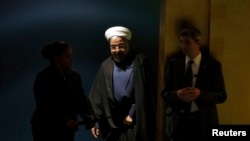U.S. Secretary of State John Kerry, Iran's foreign minister, and a top EU official meet Friday in New York to continue a conversation that began Thursday night. They are taking stock of the ongoing negotiations on limiting Iran's nuclear program in exchange for lifting some economic sanctions.
Earlier Thursday, Iranian President Hassan Rouhani said in a speech to the United Nations General Assembly on Thursday that Iran is committed to serious and honest negotiations on its nuclear program but will not stop enriching uranium.
Rouhani said that getting a deal on Iran's nuclear program would be an "historic opportunity for the West to show that it does not oppose the advancement and development of others."
"This agreement can carry a global message of peace and security, indicating that the only way to attain conflict resolution is through negotiations and respect, and not through conflict and sanctions," he said.
International sanctions designed to force Iran into cooperating with Western demands to curb its controversial nuclear program have depressed the value of Iran's currency and lead to sharp increases in some consumer prices, As talks between the West and Iran continue, there has been talks on steps to ease sanctions.
In an interview with VOA, the chief U.S. negotiator in these talks, Undersecretary of State for Political Affairs Wendy Sherman, said sanctions relief will benefit all Iranians.
"As soon as we suspend our major sanctions – which will happen very early in the agreement – the world will flood into Iran,” Sherman said. “Many international delegations have already been to Iran and so they will begin to see what they can do."
With two months left in scheduled talks on Iran's nuclear program, this is when negotiations get tough, said American University professor Hillary Mann Leverett.
"There are deep divides,” she said. “And it may not be possible to bridge the differences on these issues. But I think at the end of the day the two sides have decided that it is in their strategic interest to reach a deal. And that in some ways some of this is just noise."
Rouhani said on Thursday that Iranians will pursue their "full nuclear rights" under international law in keeping with national pride and independence.”
"If this obvious national fact is not understand by our negotiating partners and they commit grievous miscalculations in the process, a historic and exceptional opportunity will be lost," he added.
Sherman said it was a "bold decision" by international negotiators to agree to talk about limited enrichment, a decision she hopes will convince Iran "to take the difficult decisions it needs to."
"We in fact are talking about a very limited enrichment program over a long period of time until Iran would be treated like any other non-nuclear weapons state under the Nuclear Non-Proliferation treaty," she said.
That would give Tehran the standing that matches an increasingly aggressive foreign policy, said American University professor Akbar Ahmed.
"It has a long history,” he said. “It has a very proud people. And it has a very clear idea of its own identity. I think it will move along its own objective, which is to be strong enough to have a nuclear deterrent to be able to then protect itself."
Ahmed said Iran benefits from the international community's distraction with Russia's invasion of Ukraine and the fight against the Islamic State.
"The last thing the West needs is another major crisis with another Middle East country, and in this case a major Middle East country that is Iran,” he said. “So I think in this environment -- with the West distracted, with so many crises bubbling in the Middle East -- Iran may just go for the home run."
U.S. negotiators say the fight against the so-called Islamic State militants has been part of talks with Iran outside nuclear negotiations.
Rouhani blamed the rise of those militants on "certain intelligence agencies" and -- in an apparent reference to U.S. airstrikes -- said the solution to stopping them must come from the Middle East itself.
Frida Ghitis, who writes about world affairs for CNN, the Miami Herald and World Politics Review, said Rouhani “devoted a remarkably large section to the threat of terrorism and extremism.
“But then he put the blame squarely on the West, saying extremism -- and ‘anti-Westernism’ is the result of the West's strategic blunders in the region,” she said. “By framing the problem that way, he managed to put one foot in the fight against extremists without moving too far from hardliners at home who blame the world's ills on the U.S. and Western powers.”
VOA's Catherine Maddux contributed to this story.






